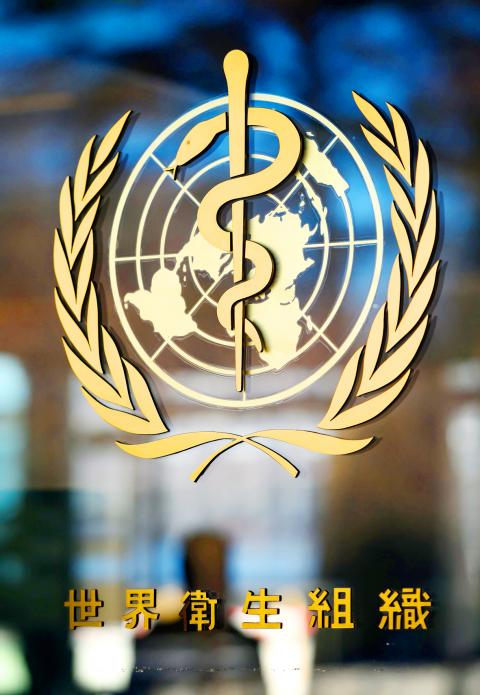China and the WHO are in the best positions to predict how the COVID-19 pandemic will develop, but most people do not trust Beijing and the WHO remains muted, Minister of Health and Welfare Chen Shih-chung (陳時中) said yesterday in response to queries by a foreign delegate.
During the Central Epidemic Command Center’s (CECC) daily news conference, Chen, who heads the center, shared a discussion he had with foreign representatives in Taiwan during a meeting at the Ministry of Foreign Affairs that morning.
He briefed them on Taiwan’s quarantine policy and next-stage border control measures, Chen said, adding that they expressed respect for the policies the nation had implemented.

Photo: AFP
One foreign representative asked him when the global outbreak might peak, but he told them that he could not make a forecast, Chen said.
“While we can see certain changes and trends, a definite end is not in view,” he said.
Only two parties can make such a prediction — China and the WHO, he said.
China has reported the world’s most confirmed cases and knows the most about how the disease arose, but its statements are not trusted by most people, Chen said.
The WHO can also make a judgement, yet it remains muted on the issue, despite having many health experts and a lot of documentation, he said.
His remarks about China and the WHO found agreement among the representatives, he said.
While Taiwan is not in a position to predict the disease’s future, the government would prepare as well as it could with a worst-case scenario in mind, he said.
Although Chen did not name any Chinese or WHO members at the news conference, Vice President Chen Chien-jen (陳建仁), an epidemiologist by training, on Wednesday criticized WHO Director-General Tedros Adhanom Ghebreyesus, and on Thursday said that the world health body’s declaration of COVID-19 as a pandemic was “too late.”
The Ministry of Foreign Affairs in a statement yesterday said that the delegates were from nearly 60 foreign countries and international organizations, and the meeting was attended by Minister of Foreign Affairs Joseph Wu (吳釗燮) and other officials.
Invited by Wu to conduct the briefing, Chen Shih-chung spoke about Taiwan’s border quarantine measures and travel warning standards, and said that the measures would be constantly updated according to the global situation, the statement said.
They lauded Taiwan’s effective and proactive action in containing the disease, its complete and flexible complementary measures, and its willingness to help those in need and share its successes with the world, the ministry said.

Taiwan is to commence mass production of the Tien Kung (天弓, “Sky Bow”) III, IV and V missiles by the second quarter of this year if the legislature approves the government’s NT$1.25 trillion (US$39.78 billion) special defense budget, an official said yesterday. Commenting on condition of anonymity, a defense official with knowledge of the matter said that the advanced systems are expected to provide crucial capabilities against ballistic and cruise missiles for the proposed “T-Dome,” an advanced, multi-layered air defense network. The Tien Kung III is an air defense missile with a maximum interception altitude of 35km. The Tien Kung IV and V

The disruption of 941 flights in and out of Taiwan due to China’s large-scale military exercises was no accident, but rather the result of a “quasi-blockade” used to simulate creating the air and sea routes needed for an amphibious landing, a military expert said. The disruptions occurred on Tuesday and lasted about 10 hours as China conducted live-fire drills in the Taiwan Strait. The Civil Aviation Administration (CAA) said the exercises affected 857 international flights and 84 domestic flights, affecting more than 100,000 travelers. Su Tzu-yun (蘇紫雲), a research fellow at the government-sponsored Institute for National Defense and Security Research, said the air

Taiwan lacks effective and cost-efficient armaments to intercept rockets, making the planned “T-Dome” interception system necessary, two experts said on Tuesday. The concerns were raised after China’s military fired two waves of rockets during live-fire drills around Taiwan on Tuesday, part of two-day exercises code-named “Justice Mission 2025.” The first wave involved 17 rockets launched at 9am from Pingtan in China’s Fujian Province, according to Lieutenant General Hsieh Jih-sheng (謝日升) of the Office of the Deputy Chief of the General Staff for Intelligence at the Ministry of National Defense. Those rockets landed 70 nautical miles (129.6km) northeast of Keelung without flying over Taiwan,

A strong continental cold air mass is to bring pollutants to Taiwan from tomorrow, the Ministry of Environment said today, as it issued an “orange” air quality alert for most of the country. All of Taiwan except for Hualien and Taitung counties is to be under an “orange” air quality alert tomorrow, indicating air quality that is unhealthy for sensitive groups. In China, areas from Shandong to Shanghai have been enveloped in haze since Saturday, the ministry said in a news release. Yesterday, hourly concentrations of PM2.5 in these areas ranged from 65 to 160 micrograms per cubic meter (mg/m³), and pollutants were